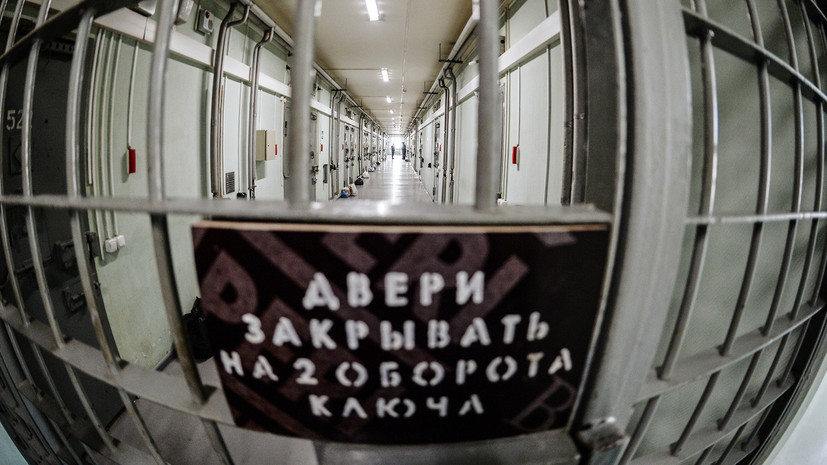Members of the Moscow Region Public Monitoring Commission, which includes RT correspondent Daniil Lomakin, have identified numerous violations of the conditions for detainees in pre-trial detention center-10 in the city of Mozhaysk. During three inspections on March 3, 6 and 18, 2020, prisoners told human rights defenders that they were forced to “take turns to sleep” because of a shortage of beds, did not receive medical care, and they could not go out on a daily basis, as expected, but only once a week. The Federal Penitentiary Service began a check.
Beds, bulbs and toothpaste
With a limit of 474 people, SIZO-10 contains more than 600 suspects, accused, and convicts. Due to the overflow of the insulator, some cells lack beds. For example, in one of the cells with six bunks nine suspects are sitting - they are forced to sleep in turn.
The management of the institution notes that, despite the not exceeding the limit significantly, the pre-trial detention center cannot refuse to accept the arrested, who are delivered by court order.
Recall that at the end of January 2020, the Prosecutor General of Russia announced the need to reconsider the approach to the election of such a preventive measure, as the conclusion in a pre-trial detention center, for suspects in crimes of small and medium gravity. As emphasized in the supervisory authority, "some of the pre-trial detention centers are substantially overcrowded," and therefore there is a "mismatch of the conditions of detention with national and international standards."
Among the regions where the problem, according to the Prosecutor General’s Office, is the most urgent, is the Moscow Region.
Another serious violation identified in SIZO-10 is related to economic support.
So, women in jail were given hygienic kits, the expiration date of which ended six years ago - in 2014. We are talking about toothpaste and feminine hygiene products included in the sets.
At the same time, right during the re-examination conducted in the pre-trial detention center three days later, the arrested were given new kits with an unexpired shelf life. According to the institution’s management, the kits were allegedly not in stock, but they were purchased and delivered to the pre-trial detention center in record time.
Another, less significant, but at the same time, as noted in the “top ten”, insoluble problem - lighting in the cameras. In some of them there are no ordinary lamps, and if there are, then only one dim lamp for 15 square meters. m. At the same time, according to the staff of the pre-trial detention center, there is no supply of bulbs in the warehouse for a long time, and they cannot buy new ones due to a complete lack of funding.
In addition, for some reason, some prisoners were not provided with the laid utensils, towels, and cleaning products for cleaning chamber rooms.
Demonstrative Search
After the first inspections and fixing by members of the PMC of complaints in some chamber rooms, heating and electricity disappeared. The detainees themselves, in conversations with members of the PMC, noted that they attributed the disruptions to criticism of the SIZO administration and regarded the incident as pressure on them and punishment for voiced claims.
In particular, the detained Yevgenia Zaripova in an interview with human rights activists noted that, in her opinion, blackouts became a punishment for contacting members of the PMO of the Moscow Oblast during a previous visit.
“In addition, we weren’t specially taken out for long walks - only once a week, although walks should be daily,” Zaripova added. “After one of the PMC events, the SIZO-10 employees also conducted a demonstration search in the cell.”
The leadership of the institution explained to human rights activists that the outages were related to malfunctions, but could not provide documented evidence of this version.
Books and medical books
There are not enough employees in the pre-trial detention center - the shortage is 14 people, who must occupy different positions. So, for example, many detainees complain that they do not receive books and periodicals from the library for weeks because of the lack of an assistant for the librarian.
Prisoners also complain of medical treatment that was not rendered properly.
One of the most serious complaints is the “miscarriage” caused by the employees of the pre-trial detention center. So, inmate Natalya Klykova (name changed . - RT ) claims to be in prison at the end of 2019 at the fifth month of pregnancy. According to the suspect, the doctors “refused to acknowledge pregnancy”, and she did not succeed in getting an examination by a gynecologist in the isolation ward until the bleeding started and the subsequent loss of the child.
Another prisoner - Ekaterina Popova (name changed . - RT ), repeatedly complained to members of the PMC that, while in pre-trial detention center-10, she could not get doctors to appoint a medical commission to prescribe a special diet. According to medical documents that human rights activists reviewed, a woman was diagnosed with renal failure - a congenital absence of one kidney.
The press service of the Federal Penitentiary Service of Russia RT said that upon receipt of a request from the editorial office, as well as on the basis of acts on control measures, members of the regional PMC in the Federal Penitentiary Service of Russia in the Moscow Region appointed an official audit.

